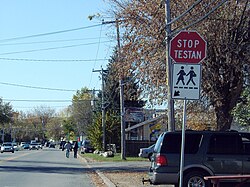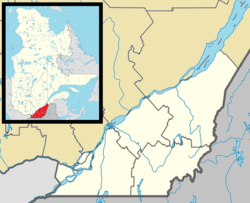Caughnawaga Mohawk
|
Kahnawake Caughnawaga |
|
|---|---|
| Indian reserve | |
| Kahnawà:ke | |
 |
|
 Location of Kahnawake, outside of Roussillon RCM. |
|
| Location in southern Quebec. | |
| Coordinates: 45°25′N 73°41′W / 45.417°N 73.683°W | |
| Country |
|
| Province |
|
| Region | Montérégie |
| RCM |
Roussillon Within RCM, but unassociated |
| Electoral Districts Federal |
La-Prairie |
| Provincial | Châteauguay |
| Government | |
| • Type | Band council |
| • Grand Chief | Joe Norton |
| • Federal MP(s) | Jean-Claude Poissant (LPC) |
| • Quebec MNA(s) | Pierre Moreau (PLQ) |
| Area | |
| • Land | 50.41 km2 (19.46 sq mi) |
| Population (2006) | |
| • Total | ~9,000 |
| • Density | 140.9/km2 (365/sq mi) |
| • Pop 2006-2011 | N/A |
| • Dwellings | N/A |
| Time zone | EST (UTC-5) |
| • Summer (DST) | EDT (UTC-4) |
| Postal code(s) | J0L1B0 |
| Area code(s) | 450 |
| Highways |
|
| Website | www.kahnawake.com |
The Kahnawake Mohawk Territory (pronounced [ɡahnaˈwaːɡe] in Mohawk, Kahnawáˀkye in Tuscarora) is a First Nations reserve of the Mohawks of Kahnawá:ke on the south shore of the St. Lawrence River in Quebec, Canada, across from Montreal. Recorded by French Canadians in 1719 as a Jesuit mission, it has also been known as Seigneury Sault du St. Louis, Caughnawaga and 17 European spelling variations of the Mohawk Kahnawake.
Kahnawake's territory totals an area of 48.05 square kilometres. Its resident population numbers about 8,000, with a significant number living off the territory. Its land base today is unevenly distributed due to federal Indian Act law that oversees individual land possession. This is unlike the Canadian norms that apply to the land around it. Kahnawake residents originally spoke their Mohawk language, and some learned French when under French rule. Together with the main Mohawk bands, they allied with the British government during the American Revolutionary War and the Lower Canada Rebellion. They have since become mostly English speaking.
Although people of European descent traditionally refer to the residents of Kahnawake as Mohawk, their autonym is Kanien’kehá:ka (the "People of the Flint"). Another meaning is "those who speak [the language] Kanienka"). The Kanien’kehá:ka were historically the most easterly nation of the Haudenosaunee (Six Nations Iroquois Confederacy) and are known as the "Keepers of the Eastern Door". They controlled territory on both sides of the Mohawk River and west of the Hudson River in present-day New York, where they protected other parts of the confederacy to the west against invasion by tribes from present-day New England and the coastal areas.
...
Wikipedia

